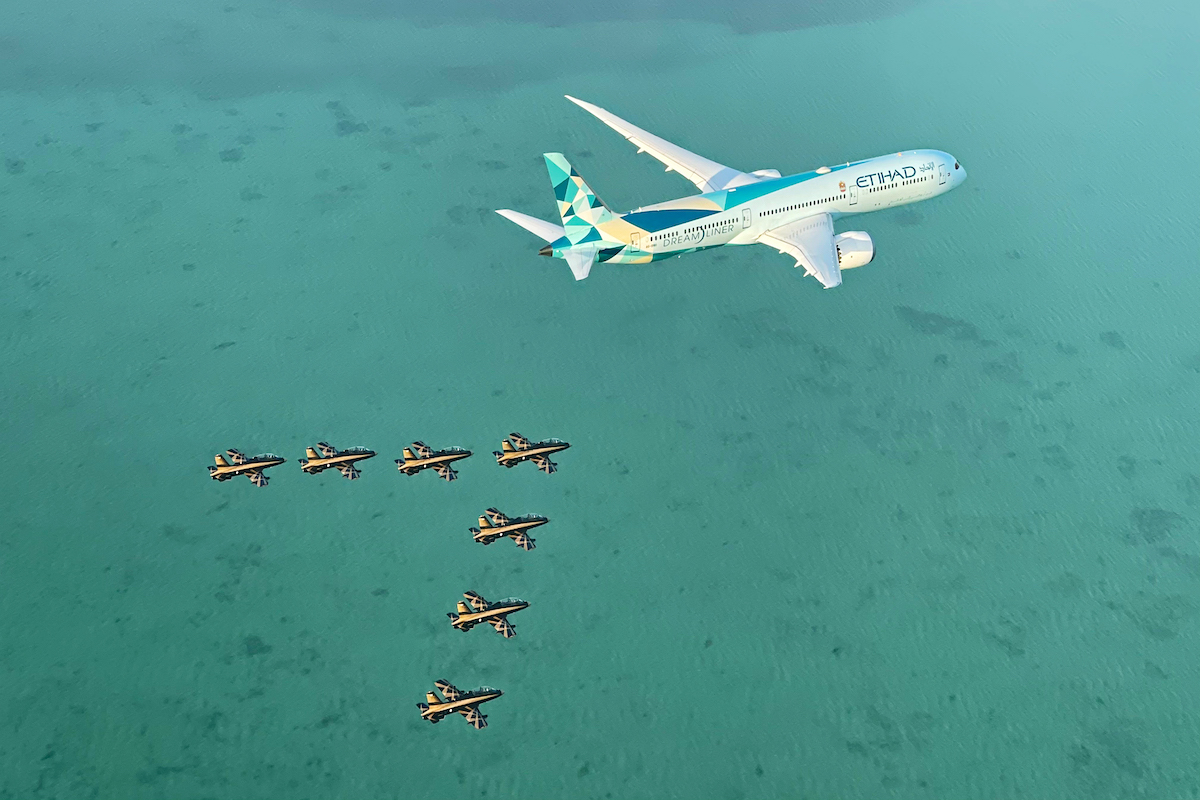Skift Take
Etihad is betting that as passengers return to flying, sustainability will be more of a concern. The Abu Dhabi-based airline is allowing passengers to offset not just their flights but even how much they drive and their use of air conditioning through its new green loyalty program.
Etihad Airways on Wednesday launched a green loyalty program, moving ahead in an emerging global effort to attract passengers committed to mitigating the impact of climate change.
“We do see ourselves as thought leaders in this space,” said Martin Drew, Etihad senior vice president of global sales and cargo. He spoke Wednesday at an online media conference, which originated in Abu Dhabi, Etihad’s headquarters.
The new loyalty program, called “Conscious Choices by Etihad,” enables members to earn miles for choices that include carrying less baggage and offsetting carbon emissions by directing miles to approved organizations.
Etihad has said it intends to achieve net zero emissions by 2050 and to cut 50 percent from its 2019 emissions by 2035.
Corporate customers can reduce their carbon footprint by earning rewards for carbon offsets, investment in sustainable aviation fuel and paying a green surcharge. “We all need corporates to take responsibility,” Drew said.
Etihad has boosted the visibility of its sustainability efforts by flying the “Etihad Greenliner,” a green Boeing 787 used to test products, procedures and other initiatives intended to reduce carbon emissions. “We have distinctive green livery, that’s a symbol,” Terry Daley, Etihad executive director of guest experience, said Wednesday.
In November, Etihad and Airbus launched a similar program involving the A350 at the Dubai Air Show.
Conscious Choices establishes a parallel green mileage program to complement the existing Etihad Guest Miles program, where passengers accumulate Tier Miles and status.
Through Conscious Choices, corporate customers can join Etihad in buying sustainable aviation fuel (SAF), which can be used to offset their own emissions. They can also pay an emissions surcharge, with the proceeds used for solutions such as planting mangroves or reforestation. The surcharge is about one percent of the total fare, Drew told Abu Dhabi-based The National.
Drew noted that for now, the cost of sustainable aviation fuel is three to four times the cost of commonly used aviation jet fuel. “But we can reduce costs,” he said. “The fact that sustainability has stayed on the agenda during the pandemic is testament to just how important the topic is to Etihad,” the carrier said, in a prepared statement.
Under the new program, Etihad Guest mileage program participants can accumulate miles for offsetting emissions from everyday activities such as driving, cooking and using air conditioning, and for donating miles to a green cause or purchasing sustainable products from the program.
Etihad said it is the first airline to reward frequent flyers for being more sustainable on the ground as well as in the air.
Etihad carrier has seen business travel returning, Drew noted.
“Despite Omicron, we are continuing to see strong consumer confidence coming back,” he said. “From a business travel perspective, we are continuing to see it bounce back.”
For the first half of 2021, Etihad reported a core operating loss of about $400 million, about half the loss in the same period of 2020. Earnings before interest, taxes, depreciation and amortization turned slightly positive.
Last month, the three global U.S. carriers all underscored their commitment to sustainable fuel and net zero emissions. Like Etihad, all three have committed to net zero emissions by 2050.
American Airlines said it will take delivery of 16 million gallons of SAF over a seven-year period beginning in 2024, with fuel delivered to San Francisco International Airport. Delta Air Lines said it has hired a chief sustainability officer, as Pamela Fletcher joined the carrier from General Motors. Fletcher is “the airline industry’s only C-Suite level CSO,” Delta CEO Ed Bastian said in a letter to employees.
On December 1, United Airlines flew a Boeing 737 Max flew from Chicago to Washington powered by sustainable aviation fuels made from cooking oil, agricultural waste and other sources. At the time, United CEO Scott Kirby said it will cost about $250 billion to ramp up SAS production so that it can be commonly used.
The Daily Newsletter
Our daily coverage of the global travel industry. Written by editors and analysts from across Skift’s brands.
Have a confidential tip for Skift? Get in touch
Photo credit: Etihad and Boeing Use the "Etihad Greenliner" Boeing 787 to test and improve their sustainability efforts. Etihad Airways
